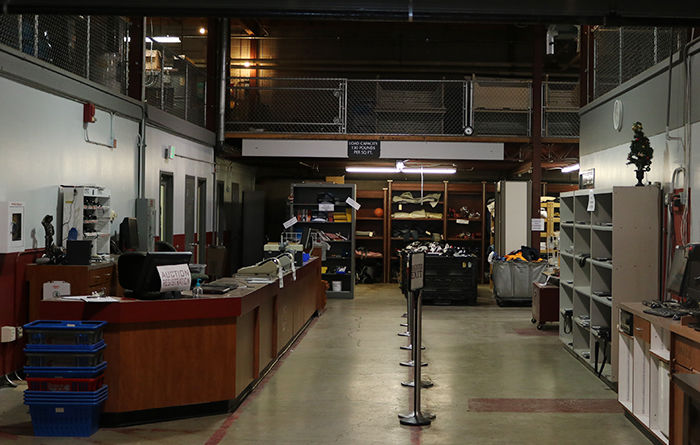A university’s leftover treasures
March 30, 2017
WSU Surplus, open to the public every Friday, sells furniture, computers, lab equipment, vehicles, athletic gear and other oddities that WSU departments wish to get rid of.
Ron Redman has been supervisor for the surplus store for more than 16 years and is in charge of making sure that the items the store receives from different departments are properly disposed of following state procedure.
“We got a surfboard one time, which was pretty cool,” Redman said. He believes a student must have left it behind after moving out of student housing, and so it found its way to the surplus store.
Every day departments bring in new things for the store to sell, and once those items are sold, that department receives money back from WSU Surplus. Redman said that each year the store is able to give thousands of dollars back to WSU departments this way.
Once new inventory has been gathered from the departments, Redman and his colleagues first look to give the property to other departments or state agencies, nonprofit organizations and municipalities.
If the item cannot be used by any of these groups, then the items are put up for sale in the 19,000-square-foot WSU Surplus warehouse to be sold on a fair-market value, Redman said.
Because there is a limited market for certain items, such as science equipment and other specialty furniture, if an item cannot be sold in the store, it is put up for live auction, he said.
Every few months the auctions attract re-sellers and scrappers looking to buy and resell or re-purpose material, so it is kept out of the waste stream. Items are also posted and sold online, and for pieces that are particularly unique, Redman posts about them on the WSU Surplus Facebook page.
“Every once in a while we get stuff from WSU athletics, like pullovers and sweatshirts that they would hand out to their athletes,” he said. Sometimes the store also re-sells athletic warm-up clothes, football cleats and basketball shoes.
WSU Surplus is also a self-sustaining organization – it receives no funding from WSU, Redman said. Any revenue the store generates from sales pays for their overhead.
“We are state mandated and follow state procedure to dispose of material properly,” he said, “but we also don’t receive funding from the state to run our own operations.”
Redman said WSU Surplus was created in the 1960s after WSU departments lacked furniture and wanted access to something more local than state surplus selection.
Today, he said, surplus shopping through state mandated organizations is important because, “it gives the tax payers an opportunity to come and purchase [state-owned items] at a cheaper value.”





















